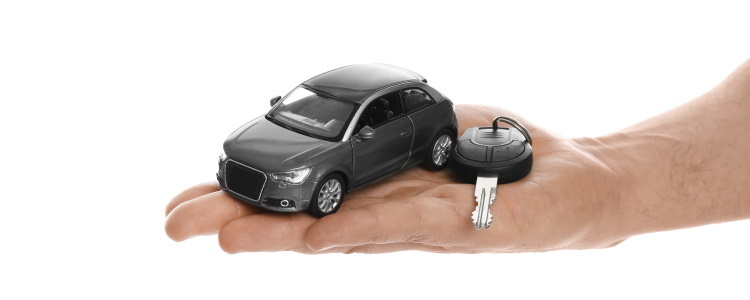A car loan with two borrowers on the title is also known as a joint auto loan. Both you and your co-borrower share all the rights and responsibilities of financing, no matter who drives the vehicle. Let's take a look at what these are, and a few solutions for co-borrower scenarios that could arise.
Co-Borrowers and Their Rights
A co-borrower is someone who takes on a car loan with another person, typically a spouse or domestic partner. In order to qualify for lending, they use their combined incomes to meet the lender's minimum income requirements. When you're in a joint auto loan, both co-borrowers are responsible for the loan payments, and you both are listed as co-owners of the vehicle on the title.
This means you have equal rights to owning and using the car, but you also share the responsibility that comes with vehicle ownership. The loan is also listed on both of your credit reports, although lenders typically use only the lower of your credit scores to qualify you for financing.
You typically only need a co-borrower for their income, but having one with a better credit score than you may open up auto loan opportunities such as a shorter loan term, more expensive vehicle options, or a lower interest rate.
ACE Tip: Remember that a co-borrower isn't the same thing as a cosigner. Cosigners help you get a loan by lending you their good credit score to help meet lender qualifications, but they have no legal rights to your vehicle.
Qualifying For a Joint Auto Loan
In order for you and a co-borrower to qualify for financing, the lender combines your income amounts to meet the minimum income qualification. However, you both typically have to meet the other loan requirements individually.
This means that before you get the co-borrower rights that come with a car loan, you have to take the responsibility to make sure you meet basic lending requirements. These include:
- Income – This can be combined to meet the minimum lender requirements, which for bad credit lenders is typically at least $1,500 to $2,500 a month before taxes.
- Residency – Most lenders require you to bring a current utility bill in your name or names for the address listed on the auto loan application.
- Proof of a working telephone – Lenders need to be able to contact both parties in a joint auto loan, so you both must prove you have working contract cell phones or a landline. Prepaid cell phones don't cut it.
- Valid driver's license – Typically you both must be able to prove your identity with a valid driver's license.
- Personal references – You each typically need to provide five to eight personal references with complete information: full name, address, phone number, and email.
Who Pays for the Loan?
When it comes to the responsibility of paying for the vehicle, insurance, maintenance, and the everyday costs of driving, that's between you and your co-borrower! However, know that no matter who you've decided has to pay what, a missed or late payment hurts both your credit scores.
If you do fall behind on the loan, a lender won't hesitate to go after you both at the same time, since you're both responsible for the payments. The lender doesn't usually take into account which one of you pays the bill, just that it's paid!
This is because you both share ownership of the vehicle. If you both stop paying the auto loan contract the car is repossessed and you're both still responsible for the deficiency balance after it’s sold, and both of your credit scores and reports reflect the damage. Repossessions stay on your credit report for seven years, so that's not the outcome you want.
But What If…
- … I want out of the loan? Getting out of a joint auto loan can take some cooperation. If you want out of the loan, it's up to you to talk to your co-borrower and see how to proceed. If their, or your, income situation has changed for the better your co-borrower may be able to refinance the loan and remove you from the contract. However, if they still need the vehicle and don't qualify for financing on their own you may be stuck in the contract until you can pay off the loan.
- … we get divorced? This depends on if you live in a community property state or an equitable division state. In most cases, assets that were jointly owned get sold and the profit from the sale is divided either 50/50 in a community property state or as the judge sees fit in an equitable division state.

- … the car is totaled? If the vehicle is totaled in an accident, you're both still responsible for the remaining balance of the auto loan after insurance covers the current market value of the loan. If you and your co-borrower insured the car with a GAP policy, though, you may not have to worry. GAP pays the difference between your loan balance and the value of the car if it's stolen or totaled while it's in a negative equity position.
- … a co-borrower dies? Never something pleasant, the death of a loved one can often come as a shock, and the last thing you need to worry about is unplanned debt. Know that if you're a co-borrower and the other party on the loan has passed away, you're now responsible for the loan, even if they were the one making payments before.
- … I want to trade-in the car? Again, trading in a vehicle typically requires both you and your co-borrower to sign off on the title and make it available for sale in most situations. Before you hurry off to get out of your old contract, make sure that your income situation is up to par for your next auto loan. If you don't have the income to go it alone, you may be required to get a co-borrower for your next loan, too.
Need Your Own Financing?
Getting out of a joint auto loan with a co-borrower is just like getting out of a loan yourself, unless the two of you aren't on the same page. If you're not in agreement as to what should happen with the car, but you own it free and clear, you could sell the vehicle privately and split the money. If you can't agree to that at least, you may have to seek professional counsel on what your next steps are.
Now that you know the rights and responsibilities of a co-borrower, you may be thinking twice about taking on a joint auto loan. If you're just thinking about a co-borrower because of a low credit situation, you may be able to use a cosigner instead, who doesn't have any ownership over the car. Or, you can try to work with a subprime lender.
These lenders are ready to take on borrowers with unique credit situations, and we know where to find them. Here at Auto Credit Express, we've built a nationwide network of special finance dealerships that are signed up with them. Let us point you toward your next vehicle loan by matching you to a local dealer. Simply fill out our fast, free, no-obligation auto loan request form and we'll get right to work!
















